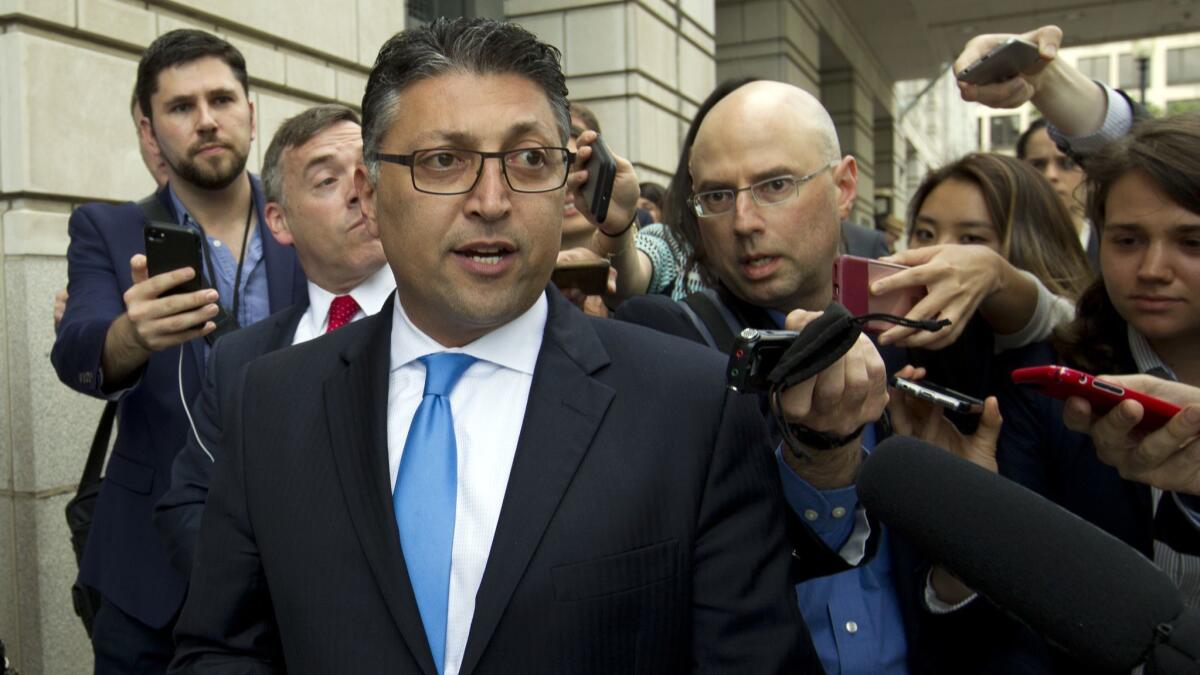Justice Department leaves decades-old music industry decrees unchanged

The Justice Department has decided against rolling back legislation that governs music licensing, averting a raft of possibly sweeping changes for the industry.
After a two-year investigation, there will be no changes to the 80-year-old consent decrees that govern two groups that issue licenses to perform music publicly, Makan Delrahim, the Justice Department’s top antitrust official, said in a statement.
The review included more than 800 public submissions as well as a workshop that featured LeAnn Rimes. While the two performing rights organizations, the American Society of Composers, Authors and Publishers (ASCAP) and Broadcast Music Inc. (BMI), had welcomed potential reform to reflect changes in the music industry, other groups said it could have caused chaos.
ASCAP and BMI were created to help songwriters, and the music publishers that represent them, negotiate licensing deals with the plethora of bars, restaurants, radio stations and other outlets that play music for the public.
Inside the business of entertainment
The Wide Shot brings you news, analysis and insights on everything from streaming wars to production — and what it all means for the future.
You may occasionally receive promotional content from the Los Angeles Times.
The decision comes three months after the Trump administration passed the Music Modernization Act in a bid to improve compensation to musicians and songwriters in the digital era.
It also marks one of the last actions Delrahim will take as assistant attorney general for the antitrust division — a role that concludes this month. The UCLA graduate has had a particular focus on removing old consent decrees that in some cases have sat on the books for more than a century.
“Throughout the division’s investigation, many licensees expressed the view that the decrees are largely working,” Delrahim said. “For many composers, songwriters, and publishers, ASCAP and BMI licenses provide the most meaningful way to be compensated for the public performance of their works with respect to many categories of music users.”
Delrahim said the ASCAP and BMI consent decrees should still be reviewed every five years. Increased competition in licensing, including more direct licensing, could trigger a need to modify the laws.
“Competition must be the watchword,” he said.
Reaction to the news was mixed.
Digital music providers welcomed the decision. “Successive administrations have now rejected calls to alter these essential pro-consumer protections,” Digital Media Assn. President and Chief Executive Garrett Levin said in a statement. The association represents the top music streaming companies including Spotify, Amazon Music, Apple Music, Pandora and YouTube. “The decrees’ protections have fostered an efficient marketplace that in turn has been critical to the resurgence and growth of the music industry.”
Others in the industry, however, were disappointed.
“We see this as a massive missed opportunity for music creators,” National Music Publishers’ Assn. President and CEO David Israelite said in a statement. The trade association, founded in 1917, represents all American music publishers and their songwriting partners.
“Our hope is that the Biden administration will pick up where this administration left off and take decisive action that would give songwriters and music publishers the ability to directly negotiate with the giant tech companies who continue to pay below-market rates,” Israelite said.
ASCAP CEO Elizabeth Matthews and BMI President and CEO Mike O’Neill said they were disappointed by the Justice Department’s ruling, but encouraged by Delrahim’s suggestion of ongoing reviews of the decrees. “Greater competition and not compulsory licensing is the answer,” they said in a joint letter.
ASCAP and BMI represent about 90% of the public performance licensing market. They pool the copyrights held by their composers, songwriters and publishers and collectively license those rights to music users, such as bars that play music and digital music streaming services.
Concerns about price fixing by songwriters led to a Justice Department antitrust lawsuit against the two organizations, bringing them under federal court supervision in 1941.
The consent decrees signed that year require ASCAP and BMI to offer licenses to their entire catalog to anyone who wants one, at a fee that’s either negotiated or set by a federal judge in a “rate court.”
Critics of the decrees argued they prevent the performing rights organizations from coming up with new licensing terms that could make the market more competitive.
American politics may be polarized, but a new law signed by President Trump on Thursday suggests that liberals and conservatives agree on the need for a better system to compensate musicians and songwriters in the digital era.
Delrahim noted that the recent Music Modernization Act has already addressed licensing problems that were leaving many songwriters unpaid. Moreover, he welcomed the two performing rights groups’ launch in December of a free licensing database called Songview, aimed at making it easier to determine which licenses users need.
The Justice Department sent an earthquake rumbling through the music industry Thursday morning, even as it insisted that it wasn’t changing a thing.
In 2016, the Justice Department concluded a similar review.
During Delrahim’s time, the department has removed some 800 of these decrees. One of the most high-profile cases was his decision to terminate the Paramount decrees.
The so-called Paramount decrees have governed film distribution and exhibition for decades. The Justice Department views them as out of date.
In 2019, the Justice Department put an end to these long-standing consent decrees that governed the distribution and exhibition of motion pictures.
The decrees, a series of settlements entered between 1948 and 1952, broke up Hollywood’s hold on production, distribution and exhibition after a landmark Supreme Court case in which the justices found studios had illegally conspired to fix prices. The most famous result of the Paramount decrees was that studios were forced to divest theaters they owned.
Delrahim joined the Justice Department in 2017 after a stint in the White House counsel’s office, helping shepherd Supreme Court Justice Neil M. Gorsuch’s confirmation.
More to Read
Inside the business of entertainment
The Wide Shot brings you news, analysis and insights on everything from streaming wars to production — and what it all means for the future.
You may occasionally receive promotional content from the Los Angeles Times.













